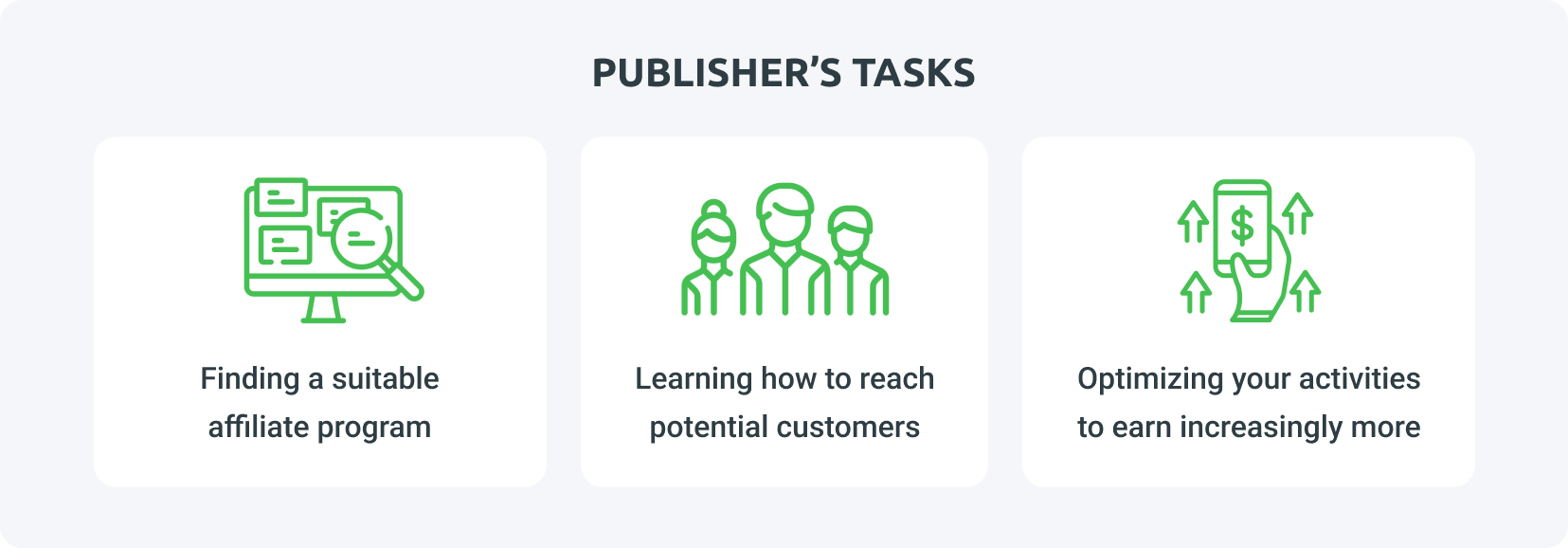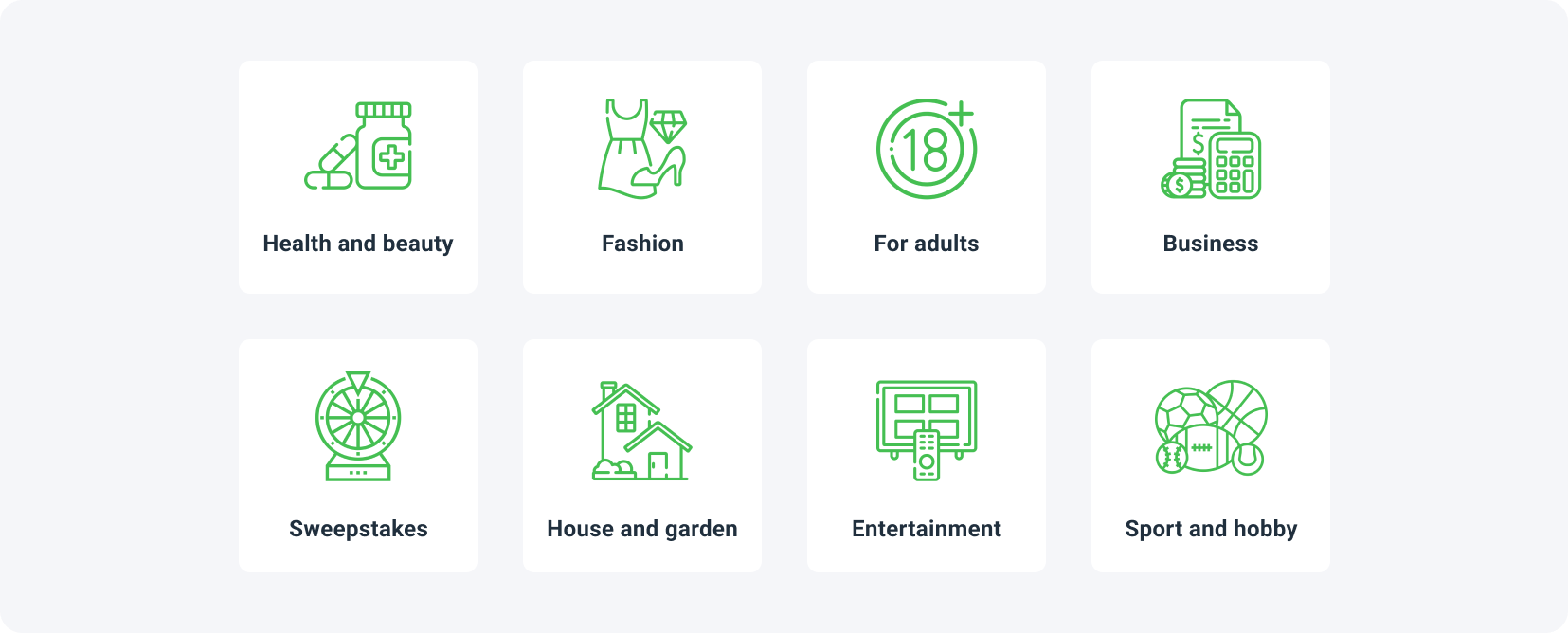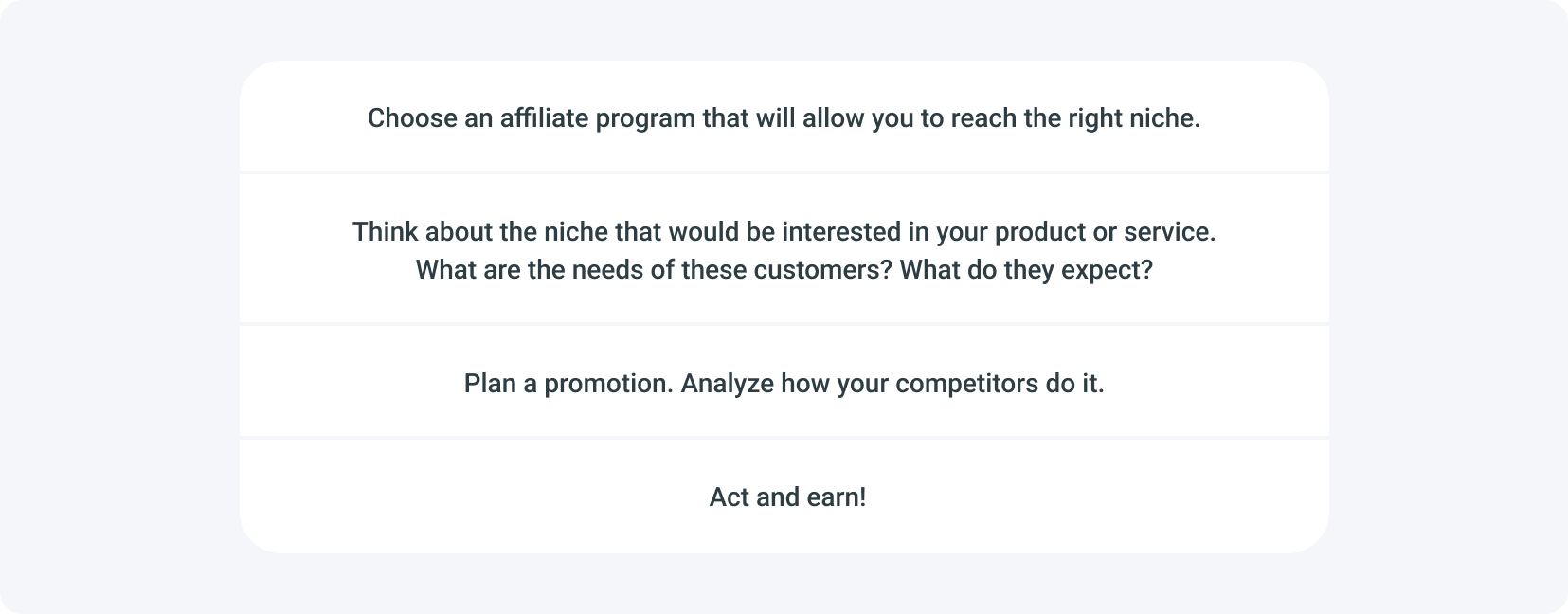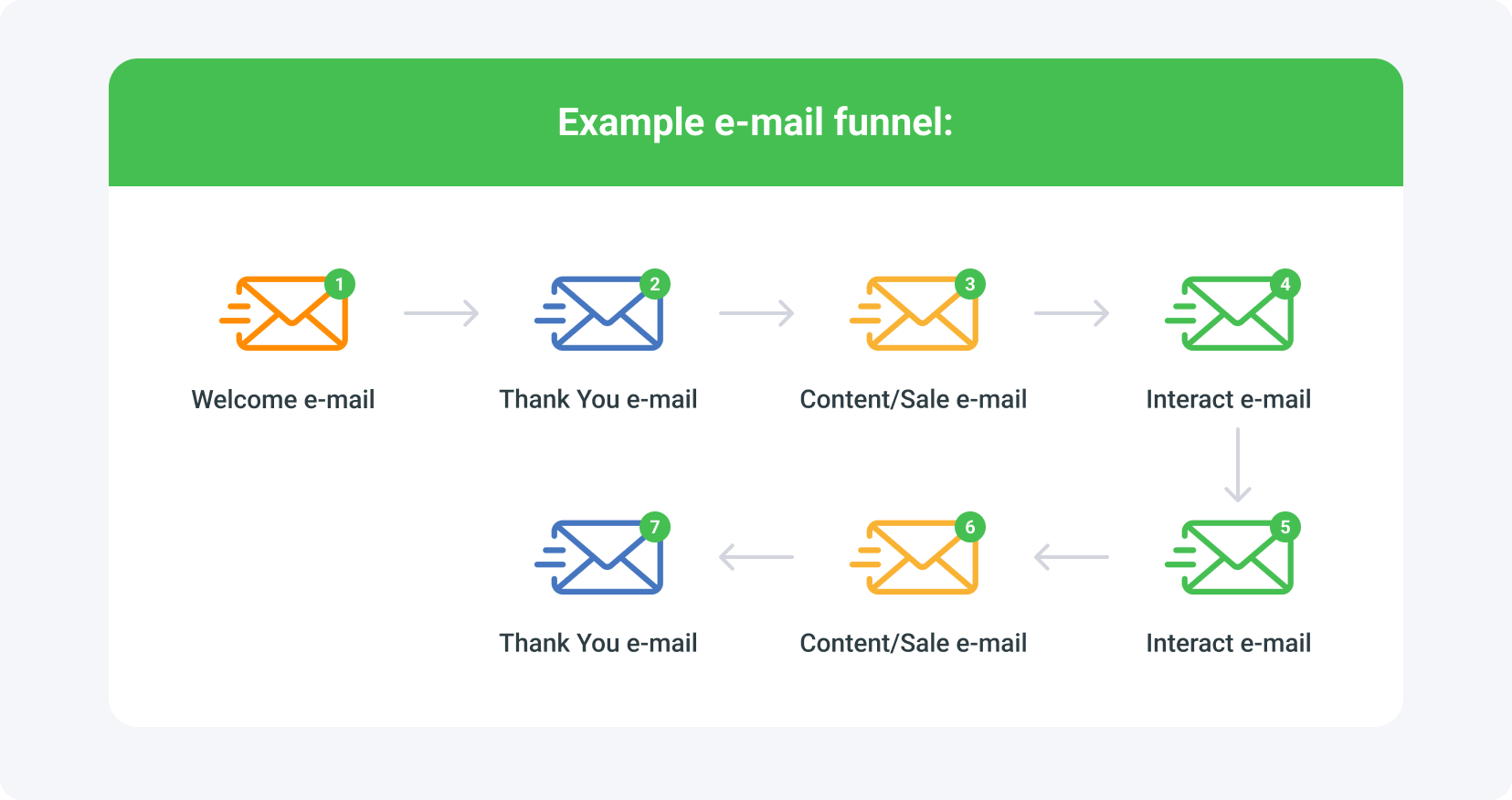
Blog / Guides
The most important information about affiliate marketing: How can you make it your source of income?
This article is updated regularly
Last update:
02 September 2025
Entering any new industry always involves learning unfamiliar slang. We understand that many terms in affiliate marketing may be confusing for beginners, and they need to find explanations for each unfamiliar word. We aim to provide our publishers with comprehensive knowledge about affiliate marketing, covering everything they need to know so they won't have to search for information elsewhere.
Let's begin with the basics.
MyLead affiliate network - what is it?
MyLead is an international affiliate network that has been steadily expanding since 2014. By earning with MyLead, you can profit from various products and services. The platform operates on a CPA (cost per action) billing model, meaning publishers earn a commission for every client action completed.

You can earn the most by selling products, which brings us back to the CPA model.
Want to learn more about how MyLead operates? Take a look at the most frequently asked questions by our publishers.

What is affiliate marketing?
Affiliate marketing involves a partnership between a publisher and an advertiser. The advertiser aims to reach a broad audience with their product or service, and the publisher, an individual like you, assists by promoting the advertiser's goods online through affiliate links. Each customer who clicks on such a link and meets the terms of the program generates a commission for the publisher.

Affiliate marketing in usage
As a publisher, you first identify an affiliate program from which you want to profit. Next, register for the chosen program. You'll get a unique affiliate link to promote the product or service upon joining.
The advertiser can reach potential customers cheaply since they don't need to worry about advertising or promotion strategies. The task of finding the target audience falls on the publisher. But what exactly is a target group? It's the people likely interested in the product or service you are promoting. For instance, sports and fitness blogs are the best places to find clients if you advertise dietary supplements for athletes. Another option is Facebook groups dedicated to sports enthusiasts. You can also find customers interested in nutritional supplements for athletes on YouTube by posting affiliate links in the comments under exercise videos or nutritionists' statements.

Explore the potential of affiliate marketing
Interest in affiliate marketing is increasing for several reasons. One major factor is that it offers passive income, meaning you earn money continuously, even when you're not actively working, such as while sleeping. This is the essence of passive income.
You might have wondered how some publishers earn substantial amounts by promoting affiliate programs. How do they achieve this? They employ effective techniques and strategies that work well.
John is a second-year student studying mechanics and machine construction. With plenty of free time, he decided to try affiliate marketing. It’s a convenient income source since he can work whenever and wherever he wants. John is also a bodybuilder and runs a blog sharing his experiences.
Kate has always dreamed of starting her online store to sell dietary supplements for athletes. With a background in sports nutrition, she ensures her store offers only high-quality products.
See an example of making money from affiliate marketing
While browsing the partners' offers, John selected a program promoting Kate's dietary supplements. As a publisher, John aimed to reach Kate's target audience. This arrangement benefits everyone: John earns a commission for each sale, Kate acquires more customers and increases her sales, and the customers enjoy a supplement that enhances their gym performance.
Specific niche - a method for guaranteed success
A niche is a specific group of customers with shared goals and expectations seeking particular benefits. Customers vary in gender, age, location, and needs.
The MyLead affiliate network provides programs across various categories, enabling you to select a program that effectively targets your niche.

Is there something suitable for you? Can you target a niche with a program from a specific category? Great! As you can see, it's not that difficult. Understanding your niche is crucial. Why? It's much easier to create an effective promotional campaign for a product or service when you know the needs and expectations of your niche or potential customers.

What not to do? The most common publisher's mistakes
1. PROMOTING MULTIPLE AFFILIATE PROGRAMS SIMULTANEOUSLY
If you're a beginner, don't promote a few affiliate programs simultaneously. It's a waste of your time. Instead, focus on one or two programs that suit your skills. Starting with a product you know well will make it much easier to begin your affiliate marketing journey.
2. CONCENTRATING ONLY ON SALES
Our experience shows that many new publishers feel satisfied only when they manage to sell a product or service. While it’s true that publishers earn money from sales, it's important to remember that selling is the final step in the sales funnel. Before making a purchase, customers need to get familiar with the product. Your original product descriptions can help with this. Ensure the description is credible, and highlight key phrases. Remember, users don’t read every word; they scan the text. Also, keep in mind that people buy with their eyes.
Need help creating descriptions? Reach out to a mentor, Czarek.

3. IGNORING THE NEEDS OF YOUR TARGET AUDIENCE
Imagine you run a blog for health enthusiasts and suddenly post about sugary snacks with hundreds of unnecessary calories. Would this content interest your audience? Probably not. The lesson here is to carefully consider who will be interested in the product before promoting it. Identify potential customers' problems and demonstrate how your chosen product can solve these issues.

4. YOUR CONTENT LACKS UNIQUENESS
“Our priority is the satisfaction and fulfilment of the customers.” How many times have you seen this on different websites? Exactly. Clichéd phrases like these don't work for affiliate marketing or anything else. Not only do they fail to attract potential customers, but they also negatively impact SEO. One of the fundamental principles of SEO is creating unique content. Only original texts have a chance to rank high in Google search results.
5. INSUFFICIENT CONTENT
Create, don't hold back. Understand that your content is what captures customers' attention. Good content entices users and creates a need for the product or service. Ensure your content is well-planned. Here are examples of content:
- Videos
- Social media posts
- Product reviews
- Email marketing
- Blog entries
Consider using colours when creating content. The colours you choose can significantly influence users' purchasing decisions. You can read more about the impact of colours in affiliate marketing.
6. RELYING ON A SINGLE TRAFFIC SOURCE
Are you relying on just one traffic source? It's time to diversify. Successful publishers experiment with multiple traffic sources and are fearless in trying new things. Explore everything available: paid ads, YouTube, Facebook, Instagram, and engage in blog forums. Then, analyse your results and conclude. Regularly reviewing statistics will help you identify which traffic source brings the most valuable users, those who make purchases.
7. DON'T NEGLECT SEO

How can you effectively promote offers?
Your earnings depend on various factors, including the promotion strategy you choose. Planning your strategy is a crucial step that should be considered. Experienced affiliate mentors from MyLead have shared their knowledge and highlighted the most effective promotion methods. Get to know them.
1. BUILDING YOUR EMAIL LIST
Email content is an ideal place to include an affiliate link. Email marketing is highly effective. It's essential to manage the sequence, volume, and frequency of your emails carefully.
Example e-mail funnel:

When preparing your emails, ensure the content is original and not duplicated from the web. Also, observe how other marketers craft their emails. Subscribe to newsletters and draw inspiration from the best.
2. ENGAGE ON SOCIAL MEDIA
Create content you would want to read yourself. Incorporate statistics, research, and results in your posts. Demonstrate how the product you promote can solve your audience's problems. Consider organising contests to increase traffic to your website. However, avoid overloading your posts with affiliate links, as this can be untrustworthy and artificial. Aim for your audience to view you as a professional and an expert in your field.
Additionally, adapt the form of your content to fit the specific social media channel you're using.

Contact our mentor if you need help promoting your products on social media. Czarek is available to help. He is a skilled affiliate marketing practitioner who generously shares his extensive knowledge with MyLead publishers.
3. EMPLOY PROFESSIONAL TOOLS
Utilise professional tools such as those provided by MyLead for its publishers. This includes reliable Content Lockers and specialised systems that restrict access to certain parts of your content. You've likely encountered this functionality online before—wanting to download a file only to find out you need to pay for it first. That's how Content Lockers operate. They enable you to block access to specific content, files, videos, and applications. You can read more about Content Lockers here.
4. CLOAK AFFILIATE LINKS
While direct affiliate links can be advertised successfully, MyLead mentors consider this practice suboptimal. These links often need to be more attractive and indicate their affiliate nature, which might deter users from clicking or prompt them to remove your ID, leading to lost earnings. This issue can be mitigated using popular link shorteners like bitly.com and goo.pl, though better solutions exist. The most effective approach is to use your domain.
Unfortunately, it’s common for links to be blocked on social media. If a specific link or domain is blocked on platforms like Facebook, all posts containing that link will be removed, losing an entire traffic source. This is perhaps the worst-case scenario you can imagine. However, there are ways to bypass Facebook’s security measures.
Check out our free ebook on Facebook for more information on effectively earning money.

An affiliate journal is a valuable and frequently used tool for organising your work and simplifying the process of drawing insights. By examining other publishers' journals, you can gain helpful knowledge about their practices, receive advice, and understand affiliate marketing from a practical standpoint.
In addition, these places bring together the affiliate community, which helps to broaden one's perspective on different forms of promotion and gain free affiliate knowledge from others.
On affiliate forums, you can find earning journals shared by our publishers. Contact us if you keep such a journal or plan to start one. We’d happily support and reward you with a code to increase your offer rates.
Affiliate dictionary
A glossary of the most frequently used terms associated with earning money on MyLead.
CPA (Cost Per Acquisition or Cost Per Action) - a form of conversion rate marketing. Cost Per Acquisition refers to the fee a company pays for an advertisement that leads to a sale. Similarly, Cost Per Action is the fee paid for an ad that results in an action, such as signing up for a newsletter or downloading an eBook. In both cases, the company only pays for advertisements that result in the desired actions.
The CPA consists of:
CPC (cost per click) – payment for clicking on an affiliate link
CPD (cost per download) – payment for downloading the file
CPI (cost per install) – payment for installing an app
CPL (cost per lead) – payment for obtaining a sale lead (correct filling out the contact form)
CPM (cost per thousand, “M” as Roman 1000) – payment for 1000 views/clicks/other actions
CPO (cost per order) – payment for the order (regardless of the value of purchases)
CPR (cost per registration) – payment for each registration in a given website/game/portal/other
CPS (cost per sale) – payment for the sale made through affiliate link
Types of CPA Offers:
Credit Card – a lead is approved after the customer's credit card is connected and charged
Email Submit – a lead is approved after entering the email address in either DOI or SOI format
Incent – an offer that can be advertised anywhere, including generating motivated traffic
Non-Incent – an offer that requires only high-quality traffic; motivated traffic is prohibited
Lead Gen – a lead is approved for obtaining lead sales (CPL)
PIN Submit/Confirm PIN – a lead is approved after confirming the PIN from an SMS message; this category also includes SMS MO offers
Sell Gen – a lead is approved for generating sales (CPS)
Survey Completion – a lead is approved after correctly completing a survey
SOI (Single-Opt-In) – a lead is approved immediately after entering the email address without the
DOI (Double-Opt-In) – a lead is approved after the user confirms their email address
Types of SMS and IVR Models:
IVR – involves a paid call in which the client calls a specified number and enters our internal number. Publisher earns compensation for every second of the call. The internal number acts as our identifier, allowing the system to allocate the commission correctly. The client must have sufficient funds to connect to the premium number.
MO – an SMS Premium service in which the client sends a text message to a specified number and makes a one-time payment based on the selected rate. Our commission is about 35% of the SMS price.
MT – a subscription service where the customer provides their phone number and receives a text message with subscription details and an access code. After entering and confirming the access code, the subscription is activated, and the client can unsubscribe anytime. The customer cannot register twice for the same service. MT includes subscription (one-time payment) and renewal (multiple payments) rates. If the mobile operator doesn't support the MT model or the user has blocked subscriptions, the payment defaults to the MO model after the number is entered.
SMS CHAT – a repeated SMS Premium service in which the client sends text messages to a given number and receives replies, facilitating a conversation via text. We earn a commission for each message the client sends during the conversation. The client must have sufficient funds in their account to send SMS messages.
Other Terms Every MyLead Publisher Should Know:
- Active Income – Earnings that require continuous work and stop once the work is discontinued.
- Affiliate Network – A service that acts as an intermediary between the advertiser and the partner (marketer).
- Branding – Building brand awareness, for instance, through banner campaigns.
- Cloaking – Hiding partner links or pages, such as showing search engine robots a different version of the page.
- Conversion – This occurs when someone completes the desired action on the landing page you're promoting, like sending a Premium SMS, registering an account, or downloading a file.
- Cookie Stuffing – A dishonest practice where cookies are inserted into unsuspecting users' browsers to obtain commissions.
- CTR (Click-Through Rate) – A metric that defines the ratio of users clicking on a specific link to all users visiting the site with that link.
- Fraud – Earning a commission in a manner inconsistent with the regulations of the partner program.
- FP – Short for a Facebook fan page.
- Landing Page – An advertising page designed to achieve the highest possible conversion rate.
- Lead – A person who has submitted their information or correctly filled out a contact form on a sales page.
- Motivated Traffic – Traffic generated by offering money or other incentives for using your affiliate link is generally prohibited in most partner programs.
- Niche – A market segment characterised by the specific needs of potential customers.
- Offerwall Rewards (OWR) – This advertising format allows users to earn points by watching ads, completing surveys, and participating in other activities, which can be exchanged for monetary or tangible rewards, like gift vouchers. It caters to portal and app owners, as well as individual publishers, expanding their scope of activities.
- Passive Income – Earnings that do not require active work, such as income from a well-positioned website or active referrals.
- PP – Short for partner program or PayPal.
- Referral – A person who registers through your referral link.
- Referrals System – A system that allows you to recommend a partner program and recruit new partners in exchange for a percentage commission.
- Reflink – A unique affiliate link used to promote websites, goods, and services, or to recruit referrals.
- ROI (Return on Investment) – A metric that defines the percentage return on investment; calculated as (revenue - cost) / cost * 100%.
- S4S (Share for Share) – A promotion method, such as sharing a Facebook fan page in exchange for another share.
- SCAM – A fraudulent or dishonest earning service.
- Search Engine Marketing (SEM) – Processes that increase website visibility in search engines, including both organic SEO and paid search results.
- Search Engine Optimization (SEO) – Techniques to improve a website's position in search engines, categorised into "white hat" (compliant with search engine regulations), "black hat" (non-compliant), and "grey hat" (a mix of both).
- Search Engine Reputation Management (SERM) – Processes aimed at improving a website's image in search results, combining SEM, SEO, and efforts to remove negative reviews.
- Search Engine Results Page (SERP) – The page displaying the results of a search query, including the position of the analysed page.
- Spam – Unsolicited email, message, or content containing commercial information.
- UU (Unique User) – A unique visitor to a particular website.
- Viral – Viral advertising that encourages or compels users to promote the website further, typically through social media.
- YT – Short for YouTube.com service.
Any additional questions?
CONTACT US

This guide provides the essential information you need to understand affiliate marketing. We aim to keep it simple to avoid overwhelming you as you begin your journey. We hope the insights shared here will help you get started in affiliate marketing. Good luck!
Have any questions? Feel free to reach us through our channels.